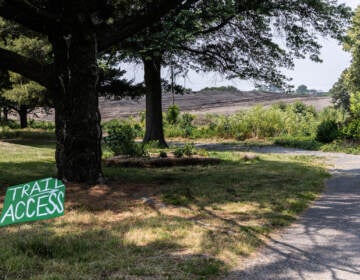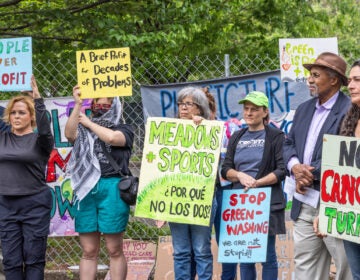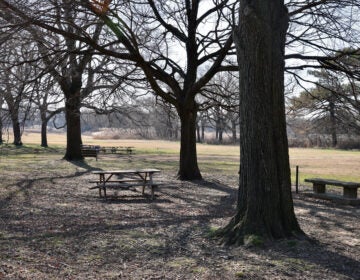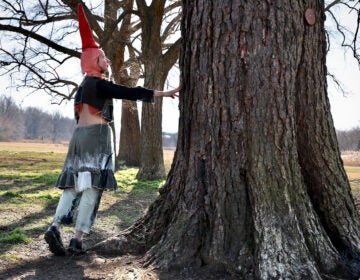Residents suing over FDR Park tree clearing accuse judge of potential bias
One expert on judicial ethics said the connection is too indirect to require the judge to recuse herself.
Listen 1:27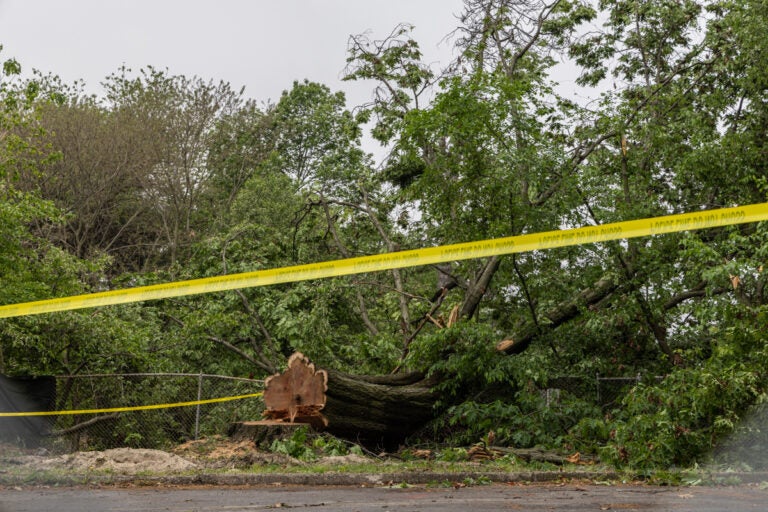
Tree clearing started on May 3, 2024 in FDR Park in South Philadelphia. (Kimberly Paynter/WHYY)
Have a question about Philly’s neighborhoods or the systems that shape them? PlanPhilly reporters want to hear from you! Ask us a question or send us a story idea you think we should cover.
The fight over a plan to build new athletic fields at FDR Park in South Philadelphia has entered the realm of legal ethics and trust in the judicial system.
A group of residents suing to stop the controversial cutting of trees for the park renovation accuse a Commonwealth Court judge of having ties to the nonprofit running the project. The basis for their lack of confidence in an unbiased decision are contributions to the judge’s most recent election campaign by a public relations firm that has represented the nonprofit.
“The problem is the public perception that is at issue here due to the appearance of impropriety,” the residents’ lawyer, Sam Stretton, wrote. “The Appellants feel they did not get a fair shot and feel that the Court system has been influenced as a result of the contributions.”
The Commonwealth Court judge, Ellen Ceisler, responded forcefully, refusing to step away from the case.
“[The] assertions of conflict are baseless, reckless, and disrespectful,” she wrote.
Judicial ethics experts said it can be a good idea for judges to recuse themselves if they want to avoid even the appearance of a conflict of interest. But they stopped short of saying Judge Ceisler needs to recuse herself in this case.
“If we said to judges, ‘You need to disqualify [yourself] every time there was so much as a whiff of bias, a whiff of partiality,’ it would be very, very hard to keep the the courts open, because there would be disqualification at every turn,” said Charles Geyh, a professor who focuses on judicial ethics at the Indiana University Maurer School of Law.
A fight over tree cutting
The $250 million renovation of FDR Park is already underway. It’ll bring a new welcome center and field house, dozens of new athletic fields and courts, playgrounds, a tidal wetland and nature trails to the park.
Officials with the Fairmount Park Conservancy, the nonprofit raising money for and implementing the renovations, say the goal is to resolve chronic flooding problems at the site and boost its resilience to climate change. Proponents, including Mayor Cherelle Parker and youth sports advocates, say the new fields and courts will mean better athletic opportunities for young people in a city where quality playing fields are scarce.
But critics of the plan accuse the Conservancy of greenwashing and misleading the public about the environmental benefits of the project. The nonprofit recently cut down 48 large “heritage trees” in the former golf course area of the park that some users call “The Meadows,” to make way for artificial turf athletic fields and courts. The current phase of the plan calls for the clearing of around 375 smaller trees — most of which have already been felled, said Conservancy spokesperson Cari Feiler Bender.
Rich Garella, the lead plaintiff in the suit against both the Fairmount Park and the City of Philadelphia, is a member of the activist group Save the Meadows. He said the group hopes to stop further tree clearing and prevent construction of the artificial turf fields, which they fear could contain toxic chemicals.
“We think they are responsible for a terrible environmental mistake,” he said. “There’s still a lot left to save.”
Next steps for construction include raising parts of the former golf course to address flooding and preparing the area for new plantings, playgrounds, stormwater management systems and athletic facilities, Bender said. The Conservancy plans to plant over 1,000 saplings in the northwest corner of the park starting in 2026, to replace the trees it is cutting down.
“Water management is one of the core objectives in this construction stage, which will lay the foundation for collecting and redistributing rainwater and stormwater to ensure the park is functional for generations — even in a hotter and wetter climate,” Bender said.
Opponents of the park renovation question the validity of the flood mitigation plans and say it will take decades for the new saplings to serve the same ecological function as the older trees.
The city’s lawyers have said the turf vendors being considered have provided written guarantees that their products do not contain PFAS.
Residents’ suit so far fails to stop the project
This spring, close to a dozen residents of South Philadelphia sued the city and Fairmount Park Conservancy in an attempt to stop the park renovation.
The residents, some members of the activist group Save the Meadows, claimed the planned changes would be a “radical” transformation of the park that would require approval in Philadelphia Court of Common Pleas Orphans’ Division and by City Council. They also claimed the renovations would violate Pennsylvanians’ constitutional right to clean air, pure water and preservation of the environment.
Last month, a Philadelphia Court of Common Pleas judge dismissed the suit, saying Orphans’ Court lacks jurisdiction in the case. The judge ruled that even with the proposed renovations, the underlying purpose of FDR Park will remain the same. (The Fairmount Park Conservancy argued in legal briefs that it should not be a defendant in the case, because it does not own the park and is not a public entity.)
In the days following that decision, the Fairmount Park Conservancy cut down the 48 heritage trees in the former golf course area of the park.
The residents then appealed to Commonwealth Court, seeking an order that would delay any further tree cutting.
Judge Ellen Ceisler denied this request, writing that the residents’ lawyer offered “precious little support” for why a delay would be warranted, and that he failed to engage with well-established legal standards. She said delaying work on the project would amount to a “public harm,” since, according to the city, it could jeopardize a $30 million loan to the Conservancy for the project.
Judge Ceisler said the Commonwealth Court is likely to affirm the lower court’s dismissal of the case. But since her opinion does not amount to a final decision on the matter, the residents cannot yet appeal to the state Supreme Court, Stretton said.
Why residents accuse the judge of a conflict of interest
Judge Ellen Ceisler was elected to the Commonwealth Court in 2017, after serving for a decade in the Philadelphia Court of Common Pleas.
Pennsylvania campaign finance reports reveal a close relationship between her 2017 campaign committee, Ceisler for PA, and Ceisler Media & Issue Advocacy, a prominent communications firm run by her ex-husband, Larry Ceisler.
In 2017, the company made dozens of in-kind contributions to her campaign, totalling around $165,000 for goods and services including office supplies, printing, telephone expenses, meals and consulting fees, state campaign finance records show. Judge Ceisler’s campaign reimbursed the company for $11,000 worth of printing, digital advertising and other unspecified services.
Larry Ceisler and several current and former employees or associates of Ceisler Media also contributed. Campaign finance records show Larry Ceisler lent Judge Ceisler’s campaign a total of $170,000 between 2016 and 2017, all of which her campaign paid back. Current and former employees and consultants to Ceisler media donated smaller amounts totalling over $3,000.
Matthew McClure, the lawyer with Ballard Spahr representing the Fairmount Park Conservancy in the case, also donated $300 to Judge Ceisler’s campaign. Sam Stretton, the lawyer representing the residents, did not donate.
Ceisler Media & Issue Advocacy has recently done communications work for the Fairmount Park Conservancy related to the FDR Park renovations.
Ceisler Media staff sent members of the media a press release last May about a $10 million grant the Conservancy received from the William Penn Foundation for the renovations, as well as an advisory last October about a ribbon-cutting ceremony for the new Anna C. Verna playground, which is part of the FDR Park Plan.
A staff member at Ceisler Media also submitted an op-ed on behalf of the Conservancy’s director, Maura McCarthy, to WHYY’s PlanPhilly in December about the shortage of quality athletic fields in Philly neighborhoods.
The PR firm has also represented the Cobbs Creek Foundation, a nonprofit leasing and renovating the city’s defunct Cobbs Creek Golf Course. That organization has also faced criticism for clear-cutting trees on public land.
Garella, the lead plaintiff, found the relationship between Judge Ceisler and the PR firm troubling.
“The judge really didn’t give our side a chance,” he said. “She should have disclosed this relationship … Whether or not that affected the way that she handled the case, you shouldn’t have a judge handling a case where one of the parties is a client of her main campaign contributor.”
Larry Ceisler called the request for Judge Ceisler to recuse herself from the case “absurd and disrespectful.” He said his company is no longer representing the Fairmount Park Conservancy as of last month and that he never personally worked on the Conservancy’s account. While he supports his ex-wife’s legal career, the two never discuss her court cases or his clients, he said.
“When it comes to her job, there is an iron wall,” he said.
McClure, the Conservancy’s lawyer, declined to comment on the record because the case is still pending.
Stretton, the lawyer representing Garella and the other residents, said the real issue is the “appearance” of a conflict of interest. He admitted in his motion filed to the court that he has the “highest regard” for Judge Ceisler as a judicial officer.
What experts on judicial ethics think
The Pennsylvania Code of Judicial Conduct states that judges should “act at all times in a manner that promotes public confidence in the independence, integrity, and impartiality of the judiciary, and shall avoid impropriety and the appearance of impropriety.”
It’s understandable that the residents would be suspicious of potential bias in the case, said Geyh, the professor at Indiana University Maurer School of Law. But the connection between Judge Ceisler and the Fairmount Park Conservancy via Ceisler Media is too attenuated to require she recuse herself, he said.
“The fact that she was served well by this firm a few years ago doesn’t necessarily engender a debt of gratitude that would translate into her favoring a new client of the PR firm,” Geyh said. “In order to disqualify, it needs to be a fairly direct connection.”
Geyh said it’s common for lawyers to donate to judges’ campaigns or for law firms to do work for judges, then later appear before them representing a party in a case. It’s an unfortunate reality in a system where judges are elected and rely on contributions to fund their campaigns, he said.
“It’s the system we have, and it’s a system where we tend to sort of tolerate a measure of involvement by campaign contributors in judges’ lives later,” he said.
Some researchers have found that campaign donations do seem to affect judges’ decisions. Michael Kang, a professor at the Northwestern Pritzker School of Law, analyzed state Supreme Court decisions and contributions to judges’ campaigns, and found that judges elected in partisan elections were more likely to decide in favor of business interests as those interests’ campaign contributions rose.
“It seems like there’s some biasing going on,” Kang said. “We feel pretty confident from our work that campaign finance money matters in judicial elections and affects the decisions.”
In the American judicial system, much is left to the discretion of judges on issues of conflict, Kang said. But it is the “safe and prudent practice” for them to recuse themselves if there is a “reasonable” appearance of a conflict of interest, he said.
“I think judges … have an interest in shoring up confidence in the judicial system and their objectivity,” Kang said.
Disclosure: The William Penn Foundation also supports WHYY News.

Subscribe to PlanPhilly
WHYY is your source for fact-based, in-depth journalism and information. As a nonprofit organization, we rely on financial support from readers like you. Please give today.




